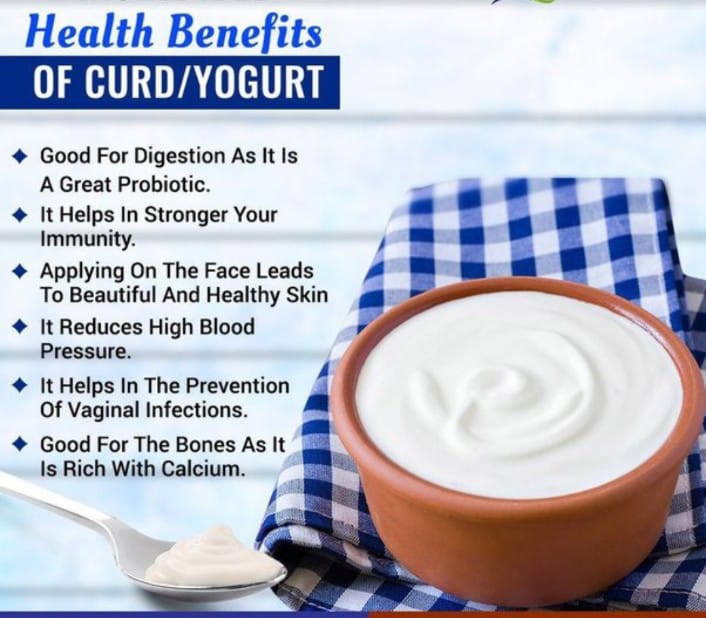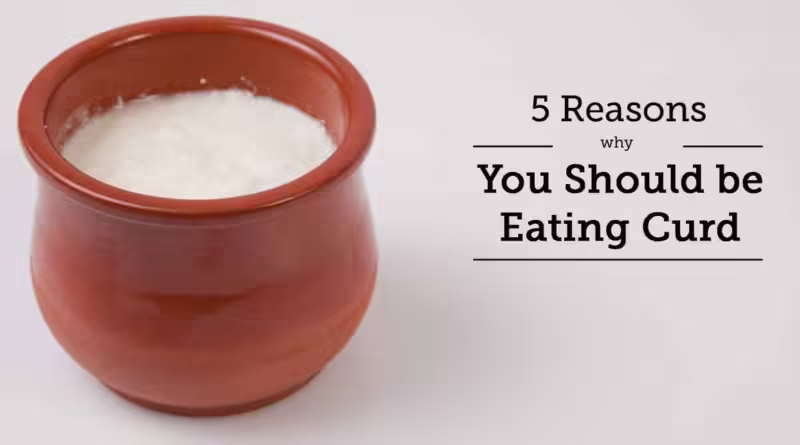5 Health Benefits: Eating Curd After Every Meal 24
Health Benefits: Eating Curd
Having good physical, mental, and emotional health is essential for living a happy and satisfying life. To improve longevity, avoid chronic diseases, and live a better quality of life, one must maintain good health. Maintaining a balanced diet is one of the best methods to guarantee strong health since it gives the body the nutrients it needs to perform at its best.

Lunches are the main source of energy, vitamins, minerals, and other vital elements, and they are crucial to this process.
It is essential to have a range of dietary categories in regular meals to preserve health. Fruits and vegetables, which are high in vitamins, minerals, and antioxidants, should make up a significant portion of a person’s diet since they strengthen the immune system and help prevent disease.
In addition to being great sources of fiber that support heart health and digestion, whole grains give off lasting energy.
While dairy products or dairy substitutes provide calcium for strong bones and teeth, protein sources like lean meats, fish, beans, and nuts are essential for muscle growth and repair. The generation of hormones and the health of the brain depend on good fats, which are present in nuts, avocados, and olive oil.
Moderation of processed foods, sweets, and excessive salt is equally crucial, as it can cause health problems such as diabetes, hypertension, and obesity. One can maintain maximum health and lead a lively, active life by emphasizing nutrient-dense, varied meals.
Compared with all the above dietary categories, some other important products are also essential for good health. One of them is curd, or dahi, also known as yogurt. In this article , we will focus on the importance of curd in our daily meals.
Do visit for related topics: Pure cow milk
Yogurt, or curd, is a common ingredient in diets all over the world and is highly regarded for both its many health advantages and rich, creamy texture. Produced by good bacteria fermenting milk, this dairy product is loaded with probiotics and important minerals like calcium, protein, and vitamins B2, B12, and D.
These “probiotics,” or living bacteria, are essential for immune system stimulation, better digestion, and gut health preservation. Frequent use of curd can help avoid gastrointestinal problems such as diarrhea and constipation and may even lower the chance of developing some chronic illnesses.
Additionally, curd is a flexible component that can be used in a wide range of meals, including main courses, desserts, smoothies, and salads. This makes it simple to incorporate curd into everyday meals. Because the fermentation process lowers the lactose level, making it simpler to digest, it is especially advantageous for those who are lactose intolerant.
Moreover, the high calcium level promotes bone health, while the protein content aids in muscle growth and repair. Curd is a tasty and healthy supplement to a balanced diet, boosting general health and well-being, whether it is eaten plain or with added fruits and honey.
Now we are going to focus on some of the most important health benefits of curd, as below:
6 Health Benefits of Curd
For stronger immunity
Curd is a dairy product high in probiotics that boosts immunity considerably. Curd contains Lactobacillus and other helpful bacteria that support the gut microbiome, which is essential for immunological function. Immune-stimulating chemicals are produced, and dangerous pathogens are kept from taking root by a healthy gut flora.
Furthermore, curd is a great source of protein, calcium, and vitamin D—all of which boost immunity and promote general health. Curd can help sustain a strong immune system and lower the risk of infections and illnesses when consumed on a regular basis.
Curd for digestive health
Due to its probiotic content—specifically, good bacteria like Lactobacillus—curd is extremely advantageous for digestive health. Assisting in effective digestion and nutritional absorption, these probiotics improve the balance of the intestinal flora. Curd helps maintain a healthy gut environment, which helps reduce typical digestive problems like diarrhea, constipation, and bloating. The high lactic acid content of curd also aids in the breakdown of lactose, facilitating the digestion of dairy by those who are lactose intolerant.
A healthy digestive system is supported by including curd in everyday meals, which enhances general wellbeing.
Curd for weight loss
Because of its low calorie and high protein content, curd might be a useful supplement to a weight loss program. Since curd’s protein reduces hunger and prevents overeating, it helps people feel fuller for longer. Because curd contains probiotics, it improves metabolism and digestion, which helps with better fat and nutrition breakdown. Furthermore, higher fat excretion and decreased fat absorption have been connected to curd’s calcium concentration.
Curd can be a helpful addition to a balanced, calorie-controlled diet by providing necessary nutrients and aiding with weight management when added to meals or snacks.
Curd for blood pressure control
Due to its high concentration of potassium, calcium, and magnesium—minerals known to help control blood pressure—curd can help lower blood pressure. Blood vessel strain is lessened by potassium’s ability to help the body manage sodium levels. For the purpose of sustaining a healthy blood pressure, the calcium in curd stimulates vascular contraction and relaxation. Curd also contains probiotics that lower inflammation and cholesterol, which enhance heart health in general.
Curd can be a heart-healthy food item that can help decrease blood pressure and improve cardiovascular health when it is incorporated into regular meals.
Curd for skin nourishment
Curd is a fantastic food and topical supplement for skin nourishment. Applying curd as a face mask can help exfoliate dead skin cells and promote a smoother, brighter complexion because it is high in lactic acid. Its hydrating qualities improve suppleness and lessen dryness in the skin. Regular consumption of curd delivers vital minerals such as zinc, vitamins B2, and B12. These elements maintain the health of the skin from the inside out. In addition to balancing digestive health, Curd’s probiotics can help treat skin disorders like eczema and acne.
You can achieve healthier, more beautiful skin by including curd in your diet and skincare regimen.
Curd for bone health
As curd has a high concentration of calcium and vitamin D, which are necessary for strong bones and teeth, it is very good for bone health. While vitamin D promotes calcium absorption and bone formation, calcium maintains bone strength and density. Phosphorus, which curd also contains, combines with calcium to create and mend bones.
By guaranteeing a proper intake of these vital minerals, curd consumption helps prevent osteoporosis and other bone-related disorders. Including curd in your diet on a regular basis will help keep your bones strong and slow down the deterioration of your bones as you get older.
Even though curd has several health advantages, there are some safety measures that should be taken before consuming it:
Lactose Intolerance : Due to the residual lactose in curd, it might still cause digestive distress for those who are lactose intolerant.
High Fat Content: Full-fat curd raises cholesterol and can cause weight gain. Choose fat-free or low-fat varieties as needed.
Allergies: Curd should be avoided by those who are allergic to dairy products in order to avoid allergic reactions.
sweeteners and Additives: Preservatives and sweeteners are added to some commercial curds. To prevent needless additions, always opt for simple, natural curd.
Excessive Consumption : Consuming too much can result in an intake of calories that is too high and possibly nutritional imbalances. Incorporate curd into a well-balanced diet.
Statutory Warning: Although curd is loaded with health benefits, it might not be for everyone. In the event that ingesting curd causes any untoward health effects, such as an upset stomach, allergic reactions, or other strange symptoms, please get in touch with your family physician right away for guidance and the best course of action. To reduce possible health dangers, always use natural, additive-free options while consuming curd.
How much to eat curd as per Ayurveda?
As per Ayurvedic advice, it is normally advised to have one or two small bowls of curd daily. Foods high in fat content and potential for mucus formation should be consumed throughout the day and avoided at night. Curd can be made even more beneficial for digestion by adding spices like turmeric, cumin, or pepper. To receive individualized guidance, always speak with an Ayurvedic physician.
When should I eat curd as per Ayurveda?
Curd is recommended to be consumed during the day, ideally around midday, per Ayurveda. This is because curd may be digested more readily at noon because the digestive fire, or agni, is at its highest. Steer clear of curd at night since it can cause gastrointestinal problems and increase mucus production. To improve curd’s digestion and counteract its chilly properties, it is also advantageous to eat it with spices like cumin, black pepper, or turmeric.
Who should avoid curd?
Curd is not recommended for consumption by certain people.
Lactose Intolerance: To prevent pain in the digestive tract, people who have trouble digesting lactose should stay away from cauliflower.
Dairy Allergy: Cream should be avoided by anyone with a dairy allergy in order to prevent sensitization.
Respiratory Concerns: Curd consumption should be restricted, especially at night, for people who frequently have colds or asthma. This is because curd might promote mucus production.
Obesity : Eat curd in moderation and choose low-fat varieties if you’re attempting to control your weight.
Persistent Digestive Disorders: Before ingesting curd, people with persistent digestive disorders, such as IBS or recurrent bloating, should speak with a physician.
For tailored advice, always speak with a healthcare provider.




